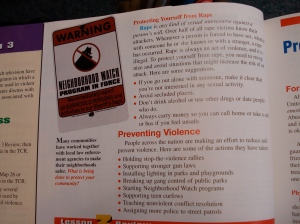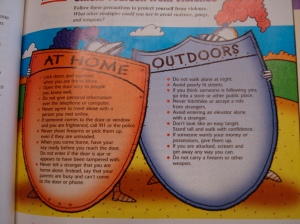Filed under: Uncategorized | Tags: adolescence, gender violence, health, high school, middle school, rape, schools, sex ed, sexual assault, sexual violence, teen, teenagers
doing violence prevention work in middle and high school for over a year now, I have seen many scary, inaccurate stereotypes about sexual violence going around, but never like today I realized to what extent the schools are perpetuating false information about rape as part of the educational curriculum. During a break between two classes today I was looking at one of the Health class book for the 7th grade and stumbled upon the chapter on sexual violence. I took pictures, but I am transcribing it for clarity.

Protecting Yourself from Rape
Rape is any kind of sexual intercourse against a person’s will. Over half of rape victims know their attackers. Whenever a person is forced to have sex, whether with someone he or she knows or with a stranger, a rape has occurred. Rape is always an act of violence, and it is illegal. To protect yourself from rape, you need to recognize and avoid situations that might increase the risk of an attack, here are some suggestions.,
- if you go out alone with someone, make it clear that you are not interested in any sexual activity.
- Avoid secluded places
- Don’t drink alcohol or use other drugs or date people who do.
- Always carry money so you can call home or tae a cab or bus if you feel unsafe.
PREVENTING VIOLENCE
People across the nation are making an effort to reduce and prevent violence. here are some of the actions they have taken
- Holding stop violence rallies
- Supporting stronger gun laws
- Installing lighting in parks and playgrounds
- Breaking up gang control of public parks
- Starting neighborhood watch programs
- Supporting teen curfew
- Teaching non violent resolution
- Assigning more police to street patrols

HOME
- Lock doors and windows when you are alone
- open the door only to people you know well
- do not give personal information over the telephone or computer
- never agree to meet alone with a person you met online
- if someone comes to the door or window and you are frightened, call 911 or the police
- never shoot firearms or pick them up, even if they are unloaded
- when you come home, have your key ready before you reach the door. Do not enter if the door is ajar or appears to have been tampered with
- never tell a stranger that you are home alone. Instead, say that your parents are busy and can’t come to the door or the phone.
OUTDOORS
- do not walk alone at night
- avoid poorly lit streets
- if you think someone is following you, get into a store or other public place
- never hitchhike or accept rides from strangers
- do not look like an easy target. Stand tall and walk with confidence
- if someone wants your money or possessions, give them up
- if you are attacked, scream and get away any way you can
- do not carry a firearm or other weapon.
I underlined some the parts I found most appalling, even though much of the premise of the idea of prevention in the book is at best inaccurate, and at worst just plain fucked up. Prevention is only seen as a potential’s victim responsibility, where each person must recognize and avoid danger. No talk of accountability or responsibility on the perpetrator’s part is even mentioned.
But besides the theoretical framing of the issue, the chapter is just spreading false information. I have worked as a gender violence advocate since 2005, and I have listened to countless stories of sexual violence, besides being a survivor myself. Most people are assaulted by someone they know, not half like the book says, but more like 70% to 80%. Most times it is a date, or an intimate person that you trust, not a stranger in a dark alley.
None of the information provided will be helpful to avoid sexual assault, it will just make the kids (and mostly girls, who feel rape is their problem) scared, and limit their freedom and mobility. How can anyone not look like an easy target? We know that people that are young, or disables, or homeless, are at a higher risk of being assaulted. Are they telling 12 year olds that they should stop looking like themselves? Or that as a disabled person, I should magically rid of my disability?
The whole chapter sets up people to feel guilty and responsible for the assault, because they should have seen it coming, or they should have been able to protect themselves. And then there is a subtle (or maybe not so subtle) racist message in the whole bit about gangs and public parks! What are they even talking about? Yes, gang rape does happen, but it is a much rarer occurrence than people being pressured into sex by who they are dating, or being assaulted by an acquaintance or even a family member.
There is no prevention, besides the decision taken by someone to not assault, to choose consensual sex, and to strive for healthy relationships. And better street lights or more cops will not cut it.